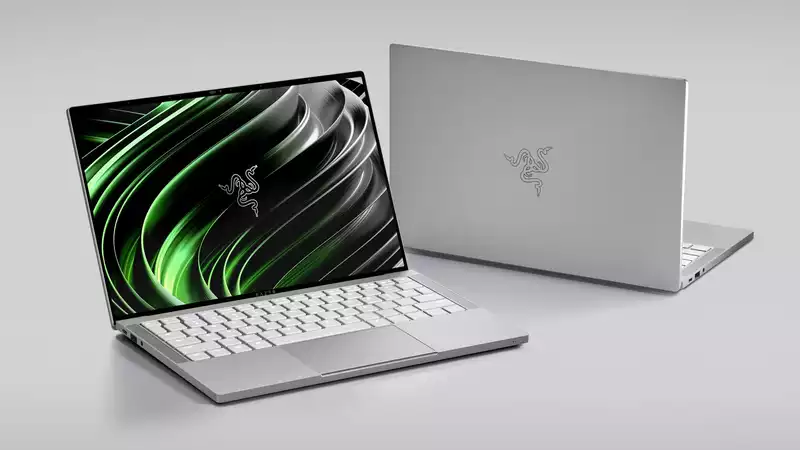The gaming computer company has entered the productivity laptop wars with the unveiling of the Razer Book 13, a laptop that will make the Dell XPS 13 and 13-inch MacBook Pro look over their shoulders.
Looking like a business laptop for those who like to game in their spare time, the Razer Book 13 has RGB backlighting on the keys, a sleek aluminum design, and an ultra-slim bezel. On top of that, Razer claims ultra-long battery life and is powered by the new 11th generation Intel Tiger Lake CPU.
However, Razer offers three different models, each with a different screen, so you can choose which one is best for you Let's take a look at the Razer Book 13's appearance and the differences between each version.
The Core i5 Razer Book 13 starts at US$1,199.99 / €1,299.99 and is available for pre-order exclusively at Razer.com and RazerStore retailers worldwide. It is scheduled to ship this month (November 2020).
The Razer Book 13 Intel® Core™ i7 configuration starts at US$1599.99/€1699.99 for the FHD+ model and US$1999 for the UHD+ model (EU pricing unknown). They are also currently available for pre-order on Razer.com, with an estimated ship date of November 2020. They will also be available at RazerStore retailers in the US, Canada, Europe, China, and Asia-Pacific.
Razer is definitely targeting MacBook lovers with the design of the Razer Book 13. Each Razer Book 13 is made from "a single block of aluminum" for a unibody design, and the laptop has an anodized mercury white finish for appearance and scratch resistance.
The three-headed Razer snake logo on the lid is a nice touch, but the Razer Book 13's biggest design feature is its ultra-thin bezel; Razer does not state the screen-to-body ratio, but the laptop has "a 13.4-inch panel with world's thinnest bezel."
Measuring 11.6 x 7.8 x 0.6 inches and starting at 2.95 pounds, the Razer Book 13 is slightly heavier than the Dell XPS 13 (11.6 x 7.8 x 0.6 inches, 2.6 pounds); the 13-inch MacBook Pro (12 x 8.4 x 0.6 inches, 3 .1 pounds) has a larger footprint and is slightly heavier.
Oh, and it wouldn't be a Razer laptop if we didn't talk about RGB lighting; the Razer Book 13 has Razer Chroma RGB backlighting on every key, which you can customize to your liking.
As for ports, the Razer Book 13 offers a decent assortment: two Thunderbolt 4 USB-C ports, one USB-A Gen 2 port, a headphone jack, HDMI 2.0, and a microSD reader.
The 13.4-inch displays on the Razer Book 13 vary depending on which model you buy, but Razer says each is "custom calibrated at the factory" and covers 100% of the sRGB color spectrum.
I'm interested in the matte FHD+ Razer Book 13 with an FHD+ 1900 x 1200 pixel panel, but those who want a touchscreen will choose between two other models: an FHD+ (1900 x 1200) touchscreen model and a UHD+ (3840 x 2400) models are also available, and both use Gorilla Glass 6 for durability and have an anti-reflective coating.
Armed with quad-core Intel 11th generation Tiger Lake processors (Core i5-1135G7 and Core i7-1165G7), the Razer Book 13 looks impressive. Turbo Boost top speeds reach 4.7 GHz; Tiger Lake chips are rated by Intel to deliver up to 20% faster performance overall; Razer has equipped the processor with a "proprietary vapor chamber cooling solution" to reduce "ambient heat and noise emissions. solution" to the processor to reduce "ambient heat and noise emissions.
The touch-enabled Core i7 Razer Book 13 laptop is Intel Evo certified, which should ensure efficient performance. Benefits include a wake time of less than one second and "consistent responsiveness" even when not plugged in.
The entry-level Core i5 model comes with 8GB of memory, while the Core i7 model has 16GB of memory; Iris Xe integrated graphics are also built into each model. The 256GB and 512GB PCIe M.2 SSDs in each Razer Book 13 are likely to provide fast load times.
Razer rates the endurance of the Razer Book 13 at up to 14 hours, but only the FHD+ (1920 X 1200) model can achieve this endurance; the UHD+ (3840 X 2400) model is rated at up to 11 hours. For comparison, the 1080p XPS 13's battery test was 12 minutes 39 seconds, disappointing its 4K sibling's 8 minutes 14 seconds (but as expected 4K devices don't last that long); the 13-inch MacBook Pro fell in the middle, at 10 minutes 21 seconds.
Intel Evo certification also applies to battery life, with the Core i7 FHD+ model requiring "no less than nine hours of real-world battery life" and lasting more than four hours on a 30-minute charge.
The Razer Book 13 may have found a way to liven up the ultra-portable productivity notebook market a bit more. Its thin bezel and Chroma RGB backlit keys give it something Apple and Dell don't. And if this battery count estimate comes true, Razer has created a laptop that will last longer than a MacBook or XPS 13.
That's why we can't wait to get our hands on it and put it through our tests, and stay tuned to find out how great the Razer Book 13 really is.
.









Comments